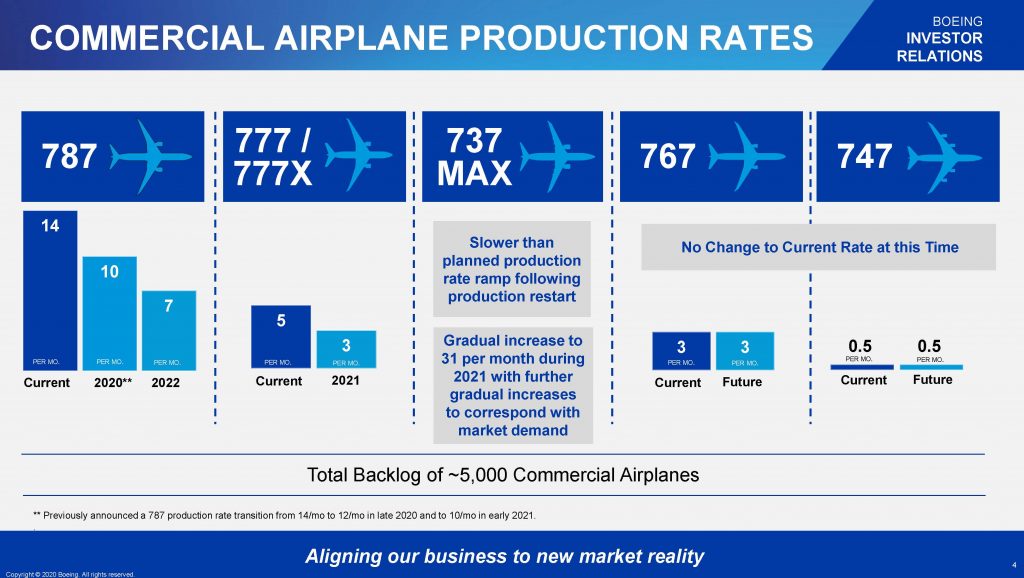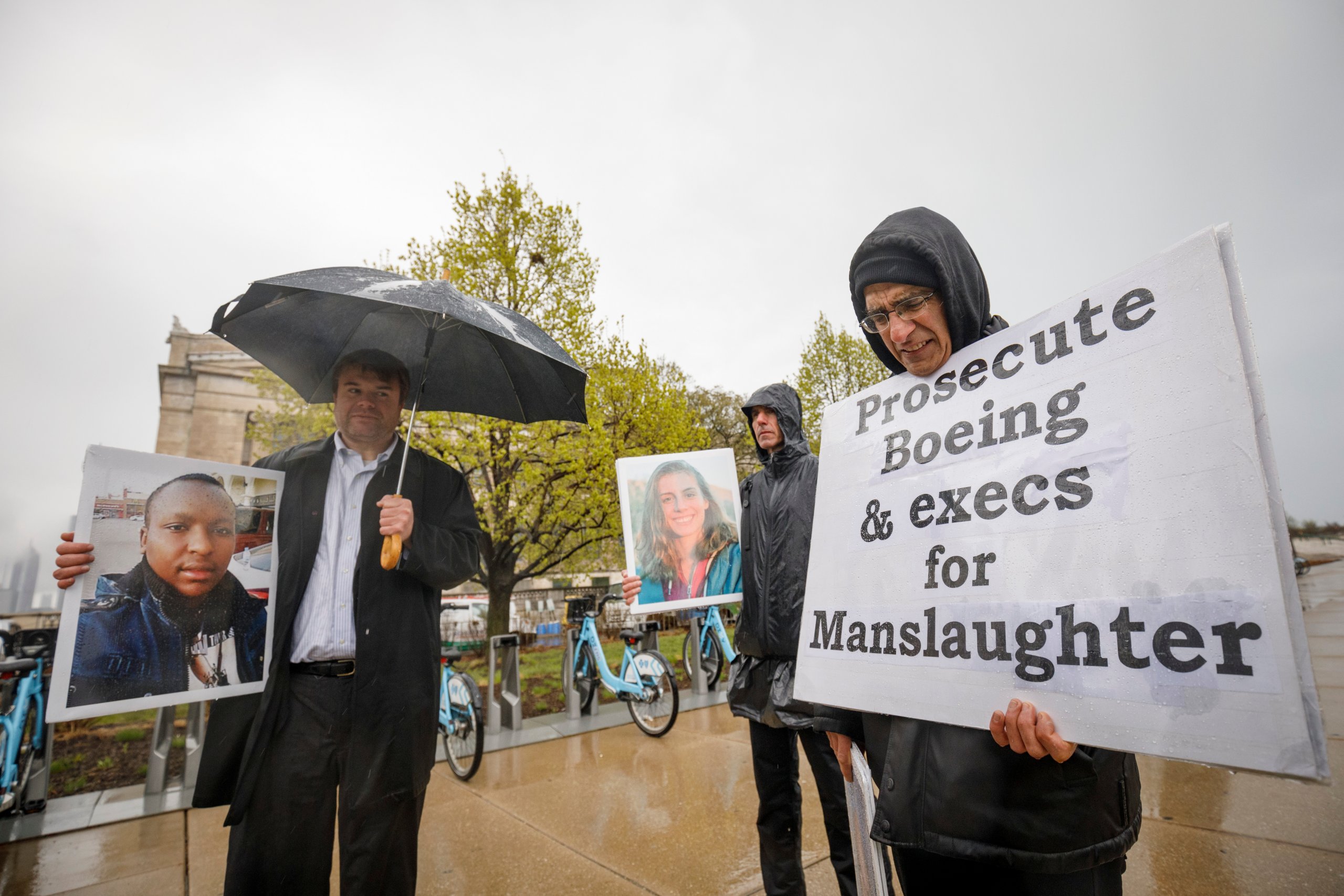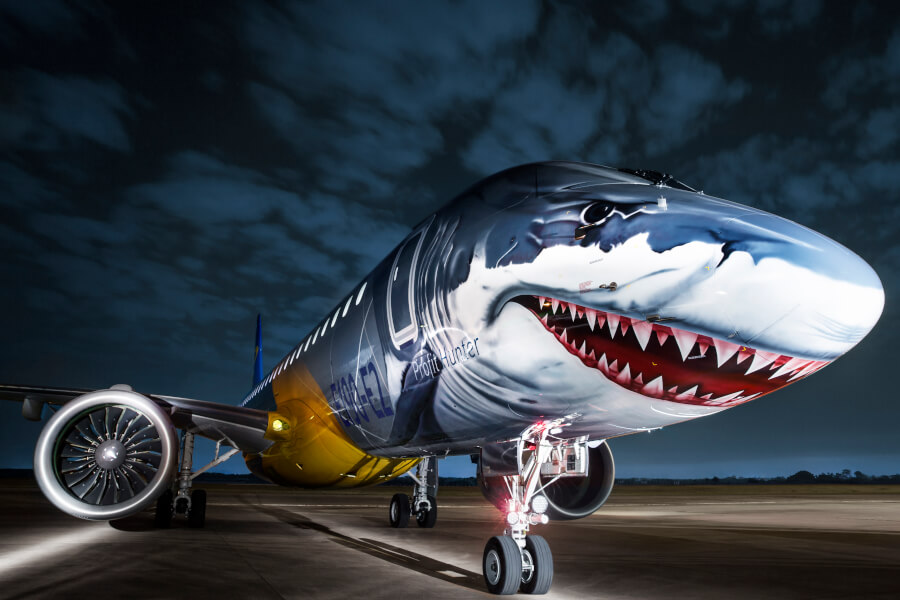UPDATED: Boeing posts Q1 loss of US$641 million
Boeing reported a first-quarter loss of US$641 million as the company continues to deal with the grounding of its best-selling 737 MAX fleet and the international grounding of the commercial aviation industry due to the COVID-19 pandemic that has killed more than 200,000 people worldwide. The company also said it plans a 10 percent staff reduction, which would equal more than 14,000 jobs and reported first-quarter revenue of US$16.9 billion, a GAAP loss per share of US$1.11 and core loss per share of US$1.70.
“The COVID-19 pandemic is affecting every aspect of our business, including airline customer demand, production continuity and supply chain stability,” said Boeing President and CEO David Calhoun. “Our primary focus is the health and safety of our people and communities while we take tough but necessary action to navigate this unprecedented health crisis and adapt for a changed marketplace.”

Boeing said as the pandemic continues to reduce airline passenger traffic, it sees a “significant impact” on the demand for new commercial airplanes and services, with airlines delaying purchases for new jets, slowing delivery schedules and deferring elective maintenance.
Download Boeing’s earnings presentation here.
“To align the business for the new market reality”, Boeing said it recently made cuts to its commercial airplane production rates and announced a leadership shift to streamline roles and responsibilities and plans to reduce overall staffing levels with a voluntary layoff programmes and additional workforce actions as necessary.
The company also announced it has:
- Drawn on a term loan facility;
- Reduced operating costs and discretionary spending;
- Extended the existing pause on share repurchases and suspended dividends until further notice;
- Reduced or deferred research and development and capital expenditures;
- Eliminated CEO and chairman pay for the year.

Hours before the results were announced, Reuters reported that Boeing is working with investment banks on a multibillion-dollar bond-fuelled financing package. The preparations reflect Boeing’s confidence that it can tap the capital markets to strengthen its finances, even as the largest US plane maker weighs seeking government aid. Boeing has lined up investment banks to potentially market an offering to bond investors in the coming days, provided that market conditions are favourable, Reuters reported. The proceeds could amount to US$10 billion or more, depending on investor demand.
- COVID-19: Boeing to reopen additional plants, activates airlift for PPE mission from China
- Boeing says it will resume commercial plane production in Washington’s Puget Sound area
- Boeing, Embraer call it quits on US$4.2 billion commercial deal as each side blames the other
- Boeing changes executive line-up as CFO gains power; legal and compliance combined
- Ethiopian 737 MAX report blames design flaws for fatal crash; FAA reportedly wants non-compliant MAX wire bundles replaced
- Boeing, FAA ‘jeopardised the safety of the flying public’ with 737 MAX actions
- Calhoun steps into Boeing hotseat
 Boeing has also considered applying to the US Treasury Department for aid under a US$17 billion programme for companies that are critical to national security, according to the sources. But CEO Calhoun has been wary of the strings attached to such aid, especially the possibility that the company would have to give the government an equity stake. Boeing is also examining the funding support available to companies from the US Federal Reserve, one of the sources said. One of Federal Reserve’s newly established programmes, the Primary Market Corporate Credit Facility, will provide support to companies issuing bonds without placing any strict conditions on them, such as limits to dividend payouts or executive compensation, according to Reuters.
Boeing has also considered applying to the US Treasury Department for aid under a US$17 billion programme for companies that are critical to national security, according to the sources. But CEO Calhoun has been wary of the strings attached to such aid, especially the possibility that the company would have to give the government an equity stake. Boeing is also examining the funding support available to companies from the US Federal Reserve, one of the sources said. One of Federal Reserve’s newly established programmes, the Primary Market Corporate Credit Facility, will provide support to companies issuing bonds without placing any strict conditions on them, such as limits to dividend payouts or executive compensation, according to Reuters.
“While COVID-19 is adding unprecedented pressure to our business, we remain confident in our long-term future,” said Calhoun. “We continue to support our defence customers in their critical national security missions. We are progressing toward the safe return to service of the 737 MAX, and we are driving safety, quality and operational excellence into all that we do every day. Air travel has always been resilient, our portfolio of products and technology is well positioned, and we are confident we will emerge from the crisis and thrive again as a leader of our industry.”
Boeing’s Commercial Airplanes division first-quarter revenue was US$6.2 billion due to lower deliveries driven by the 737 MAX grounding as well as impacts of COVID-19. The company said its first-quarter operating margin decreased to 33.3 percent due to lower delivery volume, US$797 million of abnormal production costs from the temporary suspension of 737 MAX production, a US$336 million charge related to 737 Next Generation frame fitting component (pickle fork) repair costs, lower 787 margins primarily due to COVID-19, and US$137 million of abnormal production costs from the temporary suspension of Puget Sound operations in response to COVID-19.
 Boeing said COVID-19 has adversely impacted the 737 programme due to a slower than previously planned production rate ramp-up driven by commercial airline industry uncertainty. To reflect COVID-19 impacts on the demand environment, 737 MAX aircraft production will resume at low rates in 2020 as timing and conditions of return to service are better understood and gradually increase to 31 per month during 2021, with further gradual increases to correspond with market demand.
Boeing said COVID-19 has adversely impacted the 737 programme due to a slower than previously planned production rate ramp-up driven by commercial airline industry uncertainty. To reflect COVID-19 impacts on the demand environment, 737 MAX aircraft production will resume at low rates in 2020 as timing and conditions of return to service are better understood and gradually increase to 31 per month during 2021, with further gradual increases to correspond with market demand.
The estimated abnormal production costs from the temporary suspension of 737 MAX production have increased by approximately US$1 billion due to updated production rate assumptions, bringing the estimated total to approximately US$5 billion. There was no material change to estimated potential concessions and other considerations to customers related to the 737 MAX grounding.
Boeing said its 787 production rate will be reduced from 14 per month to 10 per month in 2020 and gradually reduced to seven per month by 2022. The 777/777X combined production rate will be reduced to three per month in 2021. At this time, production rate assumptions have not changed on the 767 and 747 programmes. Commercial Airplanes delivered 50 airplanes during the quarter, including 29 787s. Commercial Airplanes captured an order for 12 787 aircraft for All Nippon Airways, and produced the 1,000th 787 at Boeing South Carolina. Commercial Airplanes backlog included over 5,000 airplanes valued at US$352 billion.
Boeing’s Shareholder Meeting

Calhoun told investors during the company’s annual shareholder meeting on Monday (27 April) that the company would need to borrow more over the next six months. Credit ratings agency Moody’s Investors Service Inc estimated this month that Boeing’s funding needs could top $30 billion in 2020. The company secured about half of this by drawing down on a $13.8 billion credit line in March, Moody’s said. Boeing also suspended its dividend.
Boeing’s first-quarter deliveries were a third of the 149 seen a year earlier and the lowest since 1984 for the first quarter.

The Chicago-based company also cancelled a US$4.2 billion deal for Embraer’s commercial aviation division over the weekend, prompting the Brazilian company to initiate arbitration.
On Monday, Boeing unveiled new voluntary layoff offers (VLOs) to employees. Boeing spokesman Bernard Choi said on Tuesday (28 April) that “several thousand employees taking VLO or retiring is our expectation.”
Prior to the release of Boeing’s results, a majority of the company’s shareholders voted to separate the chief executive officer and chairman roles permanently, sending a rebuke to the plane maker’s leadership at its annual general meeting, according to media reports.
The proposal for an independent chairman, which was opposed by management, garnered 52 percent of shareholder votes, Boeing said Monday (27 April). A measure that would have allowed investors to raise matters outside the normal annual meeting cycle got 43 percent of votes in favour, an unusually high level of support for an initiative not recommended by company leaders.
While the votes aren’t binding, they sent a clear message to the board that large institutional shareholders want more accountability after two deadly crashes of Boeing’s 737 MAX plunged the company into a deep crisis. The board had resisted calls to require an independent chairman even after establishing an outsider, Larry Kellner, in that role as part of a shakeup following Boeing’s botched handling of the accidents.

During the session, CEO Calhoun, a long-time director who stepped in as CEO in January, warned that the Chicago-based company faces a shrinking commercial market from a global pandemic, and uncertainty regarding when the situation will stabilise. Air travel won’t return to 2019 levels for at least two to three years, crimping demand for jetliners, he said. “As the industry recovers, slowly at first and then with greater vigor, we’ll be ready with a diverse portfolio of products and services that our customers want and need,” he said. Calhoun told shareholders the impact of the staggering business downturn due to the coronavirus pandemic is likely to affect the company through 2023 and beyond. “We expect it will take two to three years for travel to return to 2019 levels and an additional few years beyond that for the industry’s long-term trend growth to return,” he said.
Boeing is planning a major reduction in its workforce starting with voluntary layoffs, early retirements and other means to trim headcount to what everyone in the industry believes will be a steep slowdown in aircraft production in the years ahead.
Boeing was already reeling financially from the grounding of the 737 MAX, now expected to extend into late summer. Calhoun sold shareholders said 2,800 planes are grounded in the US alone and passenger traffic is down 95 percent. It is estimate that about 8,000 or more planes worldwide are grounded as airlines have basically stopped flying passengers on international routes with a few countries that have large domestic networks managing to maintain some traffic.
Calhoun, citing the industry’s underlying demand fundamentals — the need to connect the world’s economies and a growing middle class around the globe with the resources and desire to travel — said he continues “to believe strongly in the future of aviation and of Boeing as the aerospace leader.” There is no doubt people will start flying again,” he said. “And as the industry recovers, slowly at first and then with greater vigor, we’ll be ready.”
On the same day as the shareholder meeting, Boeing announced it will resume operations at its US facilities in North Charleston, South Carolina with most workers reporting back on 3-4 May.
Calhoun has made it clear he and his leadership team are preparing the company for a future that will look far different than two years ago. In a message sent to Boeing employees in early April, Calhoun wrote, “we will need to balance the supply and demand accordingly as the industry goes through the recovery process for years to come.”
Download the latest issue of Asian Aviation here.
For Editorial Inquiries contact:
Editor Matt Driskill at matt.driskill@asianaviation.com
For Advertising Inquiries contact
Head of Sales Kay Rolland at kay.rolland@asianaviation.com













